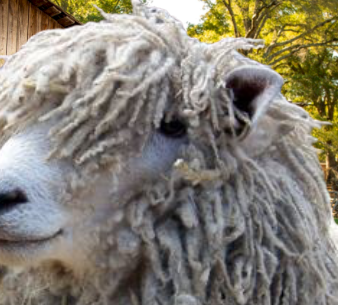The Cotswold is a longwool sheep breed developed on the Cotswold Hills in western England. Sheep have been known in this region since the time of the Roman conquest 2,000 years ago, and the breed may descend, in part, from the white sheep brought to England by the Romans.
They have stocky bodies with long, curly wool and a forelock that droops down over their eyes. The fleece is fine, soft, and white. Their faces are also white, or mottled with tan or grey. They usually have black hooves and occasionally small, black spots on the ears.
Cotswold sheep were bred originally in the Cotswold Hills of southwest England. They are thought to be descended from the long-wooled sheep that the conquering Romans brought with them to England in the first century A.D.
Characteristics
Cotswolds are large-framed sheep, with mature ewes weighing up to 200 lbs. and mature rams up to 300 lbs. They, like other longwool breeds, are slow growers, maturing at around 2 years. They are polled and have black hooves and noses as well as small black spots on their ears. Cotswold fleece hangs in locks, and the fibers have a lustrous, silky sheen. A heavy forelock falling over the face is a characteristic of the breed.

The fleece has a seven to thirteen-inch staple length and weighs thirteen to fifteen pounds. Fiber diameter ranges from 33 to 42 microns. Until recently, only white sheep were considered part of the Cotswold breed, though registration is now available for black sheep. Although these sheep are called black, their colors vary across a beautiful range of silver, bluish-gray, and charcoal hues. They can be shorn once or twice a year.
Advantages
Wool Quality and Quantity
Cotswold sheep produce high-quality, long-staple wool, making them a favorite among fiber artisans. Their wool is in high demand for its softness and durability.
Adaptability
These sheep are resilient and can thrive in different environmental conditions, ranging from hot summers to cold winters, making them suitable for a wide range of regions.
Docile Temperament
Cotswold sheep are gentle and easy to handle, making them an excellent choice for farmers, especially those new to sheep farming. Their calm demeanor reduces stress during handling and shearing.
Grazing Efficiency
They have excellent foraging abilities, efficiently utilizing pasture resources. This makes them valuable for sustainable farming practices.
Disadvantages
Slow Maturity
Cotswold sheep take longer to mature compared to other breeds, delaying the time it takes for them to reach market weight or produce offspring.
Health Challenges
Like all sheep breeds, Cotswold sheep are susceptible to various health issues, including parasites and respiratory diseases. Proper healthcare and management are crucial.
Space Requirements
Cotswold sheep require ample space to graze and roam. Small-scale farmers with limited land may find it challenging to accommodate their needs adequately.










0 Comments